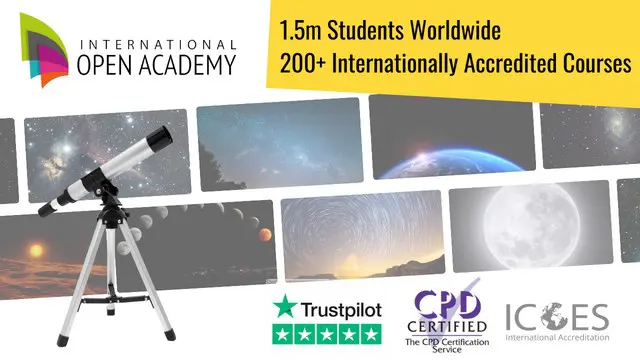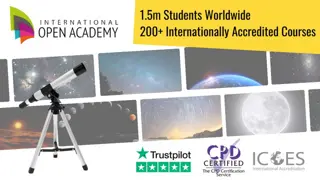
Introduction to Astronomy
CPD UK Certified | ICOES International Accreditation | 30 CPD Points | Certification Available| Free Retake Exam
International Open Academy
Summary
Add to basket or enquire
Overview
“Twinkle, twinkle, little star. How I wonder what you are.” Next time you look up at the starlit night sky, you’ll know exactly what stars and constellations you’re seeing.
It's hard to imagine something that's billions of years old. But the Universe is believed to be around 13 billion years old. So there's an endless amount of fascinating information to discover about planets, stars, comets, galaxies, meteors, asteroids and black holes, and so much more!
What is astronomy?
Astronomy is defined by NASA as the study of stars, planets, and space. It’s a huge topic and one where you’ll never stop learning. New planets, stars, and moons are being discovered all the time. New theories are put forward about the Universe, life on other planets and whether humans can live on Mars.
You can join in these amazing debates once you’ve studied Introduction to Astronomy.
Look up at the sky and read the stars
In our fascinating course, you'll look at the night sky in a whole new light! Find out:
- How to read the sky to understand more about the moon and planets
- How to identify those amazing shooting stars
- About observing meteor showers
- More about the Big Bang theory
- About the Zodiac and astrology
- How to know what stars are in the sky
KEY COURSE BENEFITS:
• Course access: 60 days – Study at your own pace
• Internationally-recognized CPD accredited course
• Start learning straightaway from any laptop or mobile device in any country
CPD
Course media
Description
How does the Universe affect you?
Could there be life on other planets? What are black holes? Are asteroids dangerous? You’ll find out once you delve into our course.
The Earth is a tiny speck in the colossal Universe. Find out how activity in Space has an impact on our lives. Learn to read the ‘clues’ by seeing the bigger picture that’s all around us.
Enjoy the sky at night with a greater understanding of how the universe impacts us all. Be able to tell engaging stories about the history of the planet. Easily identify some stars and planets with the naked eye and others with astronomers’ equipment. Know more about the various structures of the solar system.
Learn astronomy online in your own time.
We’re your flexible learning partner. Our course is online so you can study at any time and from anywhere, on any device.
Start studying our Astronomy for Beginners course online today. Your friends and family will be astounded by your newfound knowledge of life and the universe.
Students who complete this course in Astronomy and Sky Watching will be able to:
-
name and identify planets and dwarf planets and their location in the solar system
-
know the names of the various star formations in the night sky
-
understand the difference between astrology and astronomy
-
understand how the Zodiac calendar and map interacts with the planets
-
identify how the Earth is affected by moon phases, how the calendar predicts the type of moon that will occur, and how to best view the lunar eclipses that take place in the sky
-
really tell if you are witnessing a shooting star, a comet, or some other structure from the Earth’s atmosphere
-
gain a greater understanding and knowledge of astronomical history and major events such as the Big Bang, Halley’s Comet, and if black holes and asteroids are truly a danger to life on Earth
-
What life forms exist on other planets
-
You will gain a greater understanding of the world above and around you. Gain an understanding of cosmology and how the stars in the sky impact on your life
-
You’ll get a greater enjoyment from looking up at the sky and recognizing the stars and planets
Course Breakdown
Module 1: The Night Sky
- What is Astronomy?
- A brief history of Astronomy
- Branches of Astronomy
- Astronomical phenomena
- Basics of the Celestial Sphere
- Becoming an amateur sky watcher
- How to read the night sky
- Stargazing equipmen
Module 2: The Moon And Planets
- Facts about the moon
- Lunar phases
- Observing the moon
- The planets of the solar system
- Planetary facts
- Identifying characteristics to observe planets
- Dwarf planets
Module 3: Meteors, Comets, And Asteroids
- Characteristics of meteors, comets, and asteroids
- Observing meteor showers
- Haily’s Comet and other famous cases
- Identifying “shooting stars” and other comets
- The dangers of Asteroids
- How to view evidence of asteroids in the night sky
Module 4: The Stars And Zodiac
- Facts about stars
- Star formation
- Star clusters and supernova
- Identifying the constellations
- The 13 Zodiac constellations
- Astronomy vs. Astrology
Module 5: A Greater Understanding Of The Universe
- Black holes
- The Milky Way
- Galaxies
- The Big Bang
- Extrasolar life forms
- Sighting mysterious activity in the night sky
Who is this course for?
-
Everyone who has ever looked up at the night sky and wondered about the stars! It doesn't matter if you've never looked through a telescope, all you need is your curiosity to be able to start learning about the stars
-
People with a curiosity of the solar system and how the universe works
-
You, if you’d like to be able to identify major star patterns such as The Big Dipper, Ursa Major, The Northern Cross, and more
-
Anyone with an interest in the history, theories, and topics in astronomical studies
-
People who need to know more about the many mysterious structures of comets, planets, asteroids, and more
-
Students who want to become further educated in how the acts of the universe impact life on Earth
Requirements
This Introduction to Astronomy course is open to all, with no formal entry requirements.
Career path
After completing this course, you could:
-
Explore an exciting career in astronomy
-
Expand your scientific knowledge
-
Host walks and talks on the sky at night
Questions and answers
Is there any type of assessment?
Answer:Yes, there is. Each module of your course will have an exam section. The final grade will be the average of all the modules.
This was helpful.What do I need for this course
Answer:Our Introduction to Astronomy course is designed for anyone with an interest in learning the wonders of the Universe.
This was helpful.Can I use any 'point'sacquired to help towards any ,formal qualification? ie ma or degree??
Answer:IOA offers specialist courses and once you complete your Introduction to Astronomy course, you will gain a PDF certificate of completion. Our courses are accredited by ICOES and CPD Certification Service, meaning that the course counts towards the individuals' CPD hour records.
This was helpful.
Reviews
Legal information
This course is advertised on reed.co.uk by the Course Provider, whose terms and conditions apply. Purchases are made directly from the Course Provider, and as such, content and materials are supplied by the Course Provider directly. Reed is acting as agent and not reseller in relation to this course. Reed's only responsibility is to facilitate your payment for the course. It is your responsibility to review and agree to the Course Provider's terms and conditions and satisfy yourself as to the suitability of the course you intend to purchase. Reed will not have any responsibility for the content of the course and/or associated materials.



